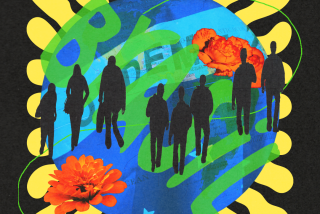Singer Finds Race Issue No Laughing Matter in Brazil
- Share via
RIO DE JANEIRO — Tiririca is one of Brazil’s most popular singers, a former circus clown who sings childish ditties, a man of humble origins and mixed race.
But Tiririca, according to some Afro-Brazilian leaders, has recorded a song that is insulting to blacks. A judge in Rio de Janeiro agreed: She ordered his record pulled from the shelves. The singer and his record company, Sony Music, have been hit with criminal and civil actions accusing them of racism.
In the aftermath, Brazil has experienced a rare nationwide debate on race. Political leaders, intellectuals and people on the street have all weighed in. It seems fitting that the catalyst for this discussion has been a song, for music is the celebration of Brazil’s multiethnicity.
The Tiririca case is more complicated and contradictory than it seems, mirroring the dynamics of race relations in Brazil. After years of scant attention to the problem, the Brazilian government has led a frank examination of racial inequality. President Fernando Henrique Cardoso created a commission this year to aid blacks and people of mixed race, who account for 44% of the population of 160 million and suffer disproportionately from poverty, crime and other social ills.
Black activists, meanwhile, are campaigning for racial solidarity--a march last year honored Zumbi, the leader of a 19th century slave revolt--and political power. One of them, a leader of the attack on Tiririca, is Ivanir dos Santos, a candidate for deputy mayor of Rio in October elections.
Dos Santos paints Sony as a corporate villain and Brazil as a society whose camouflaged racism has been exposed by the furor.
“Brazil is not a racial democracy, as Brazilian diplomats have always claimed,” he said.
Dos Santos said his role in the controversy is unrelated to his candidacy for the Workers’ Party, which is trailing in opinion polls. And he criticized “the disrespect of a multinational like Sony, which would not have done this in the United States. . . . Tiririca is exactly the expression of Brazilian racism, a mestizo [person of mixed race] who lacks ethnic consciousness and self-respect.”
On the other side, black elected officials and musicians have risen to the defense of the singer. Judging from the press coverage and random interviews in downtown Rio, many black Brazilians are dubious of the validity of the protests and feel they are overblown.
“I have been talking about it with my friends, and we feel the same way: It’s not racist,” said Wellington Evangelista, 16, an office messenger. “This is all political. There are many forms of discrimination in Brazil that they should be fighting instead.”
The song, “Look, Look, Look at Her Hair,” makes fun of a black woman’s hair, comparing it to a Brillo pad, and says the woman smells bad because she has not taken a bath. Tiririca claims it is an affectionate joke about his wife.
His critics respond that prejudice in Brazil often masks itself in casual insults and malicious humor.
“This is a symptom of the lack of self-awareness among Brazil and the Brazilians about racism,” said Carlos Hasenbalg, a leading scholar on race. “It is concealed, cordial, but it sometimes appears in explicit form. . . . Tiririca has done what people of greater learning would never do, because they know it is politically incorrect.”
In this case and others, the leaders of the protest are copying the tactics of the U.S. civil rights movement. But for decades, said Hasenbalg, such tactics have failed to generate widespread support for Brazil’s black activist groups, which remain small and splintered. The nation’s black politicians win elections by assembling coalitions based on labor unions and left-leaning political movements rather than racial blocs.
But Brazil is a different world from the United States; the “bipolar model of identity, black and white,” does not apply, Hasenbalg said.
“People don’t think like that here,” Hasenbalg said. “Race is seen as a continuum. . . . Racial groups do not have boundaries.”
In the United States, race relations were forged by segregation; society imposed strict barriers and defined individuals with any African heritage as black. Brazil has a history of intermarriage among descendants of African slaves, native peoples and immigrants from Europe, the Middle East and Asia.
Brazilians of different hues routinely socialize, intermarry and live in the same neighborhoods. The ease and warmth of the interaction is especially apparent among working people--the point of harshest conflict in the United States, where inner-city enclaves tend to be starkly divided by race.
Brazil’s unique personality and population make racial self-definition ambiguous. There are dozens of terms for skin colors; less than 10% of Brazilians identify themselves as black.
Tiririca describes his mother as black and himself as nonwhite. Like many Brazilians of African heritage, he is from the impoverished northeast. His clown-like persona and music are especially popular with children. Tiririca is a nonsensical nickname; his real name is Francisco Everardo Oliveira.
Looking somewhat bewildered by all the attention, Tiririca, 31, defended himself recently before a mostly friendly, and mostly white, audience on a television talk show.
“I am not a blue-eyed gallego [European],” he said. “If I hurt anyone, please forgive me.”
Judge Flavia Viveiros de Castro of Rio’s state criminal court did not. She ruled against the singer last month, upholding the accusation filed by activists that his verses “contain racism in its cruelest form.”
Nonetheless, Agnaldo Timoteo, a black federal congressman and former pop singer, called the accusers “false defenders of blacks.” He declared: “The prohibition of his song was a cynical act by the judiciary, a ridiculous, deplorable and cowardly act.”
Timoteo speaks from an unusual position of privilege. Only a handful of congressional deputies are Afro-Brazilian. Most nonwhite Brazilians have been shut out of wealth and influence.
In Brazil, race and social class intertwine. The gulf between the rich elite and the masses is among the widest in the world: The poor constitute half the population and earn only 12% of the national income. Many Brazilians see discrimination in primarily economic terms. “Money is the worst form of prejudice: It’s more class than race,” said a black teacher named Alcione in downtown Rio.
But the racial component to discrimination, analysts say, dictates the language of job descriptions, such as an ad seeking waiters with “good appearance”--a code intended to discourage nonwhite applicants. It populates Brazilian advertising with European-looking models; television makes Brazil look “whiter than Scandinavia,” Dos Santos said.
And occasional clashes break the calm social surface. A much-publicized case took place in an exclusive apartment building: The daughter of a former governor of the state of Espirito Santo encountered a neighbor who ordered her to take the service elevator, assuming that she was a servant because she was nonwhite.
Yet perceptions of discrimination prove tricky to pin down. In one study, more than 70% of nonwhite Brazilians surveyed said racism exists in Brazil. But only 20% said they had experienced discrimination.
Cardoso has explicitly recognized the existence of prejudice and inequality. When he talks about solutions, though, the president emphasizes “creativity” and warns against imitating other nations. He is alluding to the combination of class disparity and racial ambiguity, which pose a tough challenge to U.S.-style remedies such as affirmative action.
At the University of Sao Paulo, for example, a fledgling student movement wants 10% of admissions set aside for blacks, who are a tiny fraction of the student body. No one has come up with racial categories that would prevent massive confusion, however.
“You can’t have quotas for a majority,” acknowledged Dos Santos. “We are not a minority.”
In the United States, broad-based anti-poverty programs have been urged by policymakers and scholars, notably the African American sociologist William Julius Wilson, as a more effective approach than affirmative action. Race-neutral reforms probably represent the best hope for nonwhite Brazilians, analysts say.
In the short term, Sony Music and Tiririca are staring at a double-barreled legal assault that could result in monetary damages and criminal penalties. Although it is rarely enforced, a Brazilian law punishes racist acts with prison time. Sony hired one of Brazil’s star criminal defense lawyers, Evaristo de Moraes, to represent its two corporate executives named as defendants.
De Moraes said he doubts that Tiririca or the executives will end up behind bars. He predicted further legal disputes as Brazilians become more sensitive to attitudes and statements about race. This results from the “healthy influence” of the United States, he said.
Despite Brazil’s social problems, the lawyer, and many others, believe their ethnic mosaic is the ultimate protection against racial strife. De Moraes said: “The great quantity of mixing among blacks and whites will not permit a racial confrontation.”
More to Read
Sign up for Essential California
The most important California stories and recommendations in your inbox every morning.
You may occasionally receive promotional content from the Los Angeles Times.










